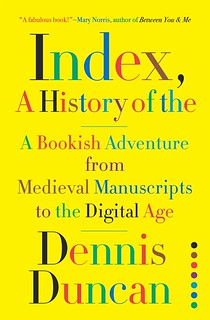
PREV ARTICLE
NEXT ARTICLE
FULL ISSUE
PREV FULL ISSUE
V25 2022 INDEX E-SYLUM ARCHIVE BOOK REVIEW: INDEX, A HISTORY OF THEFor bibliophiles, here's a review of a new book on the history of that indispensable and occasionally snarky component, the Index. -Editor
INDEX, A HISTORY OF THE
Consider, for example, the 2019 anthology An index, Duncan explains, is simply a map: a set of signposts pointing to — indicating — where to find what in the text's vast terrain. This map has three constituent parts: rubrics (generally subjects or personal names); locaters (typically page numbers, at least before the e-reader era); and an internal ordering principle (usually alphabetical).
From its inception, the index has provided a window onto the history of the book, for it took the advent of a particular type of book — the codex, a sheaf of pages fastened along one edge — to make an index a practical possibility. The progenitor of the modern bound book, the codex gradually supplanted the scroll, a medium inimical to the indexer's art. (An index in which every entry runs along the lines of
The document that today's readers would recognize as an index arose simultaneously in Oxford and Paris in the 13th century, a consequence of the voluminous reading practiced in two newly formed institutions: the universities and the mendicant orders of Franciscan and Dominican friars. With so much reading, Duncan says, came the corresponding need
In the mid-15th century, the mass production born of Gutenberg's press began to make the index a regular feature of the bound book. But its very ubiquity — and very utility — would make it an intellectual flash point. That, by some scholars' lights, was a sacrilege. The 16th-century Swiss bibliographer Conrad Gessner, a meticulous indexer of his own work, admonished:
(Gessner's anxiety, Duncan points out, prefigures by half a millennium modern fears that the seduction of instant Google searches is polluting readers' faculties for immersive engagement.) In the end, convenience trumped peril, and the index endured. By the Victorian era, compilers had realized that indexes could be far more than mere finding aids — in particular, as Duncan deliciously shows, they made splendid vehicles for settling scores.
The reviewer beat me to my own planned interjection - Google and other modern search engines are at heart simply gigantic automated indexs, immensely useful while devoid of human playfulness:
To read the complete article, see:
Wayne Homren, Editor The Numismatic Bibliomania Society is a non-profit organization promoting numismatic literature. See our web site at coinbooks.org. To submit items for publication in The E-Sylum, write to the Editor at this address: whomren@gmail.com To subscribe go to: https://my.binhost.com/lists/listinfo/esylum All Rights Reserved. NBS Home Page Contact the NBS webmaster 
|

